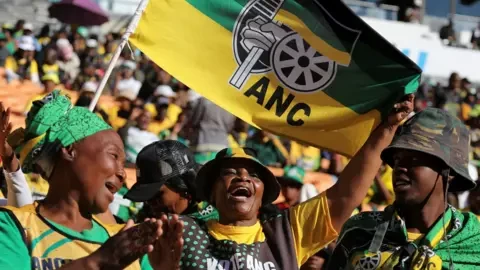
THE African National Congress (ANC) finds itself at a pivotal juncture in the South Africa political landscape.
After three decades of unparalleled dominance, the ANC must now navigate the uncharted territory of coalition politics to form the next government.
The stakes are extraordinarily high and the decisions made in the coming days will significantly impact the nation’s future direction.
This situation has arisen due to the electorate’s palpable frustration with persistent socio-economic issues.
High levels of poverty, rampant unemployment, stark inequality, pervasive crime and systemic corruption have marred the ANC’s tenure, culminating in the party losing its majority in last week’s national vote.
Despite this setback, the ANC remains the largest party, with 159 seats out of 400 in the National Assembly.
However, this is insufficient for unilateral governance, necessitating the formation of alliances to ensure a functional government.
The ANC’s predicament is exacerbated by the diverse and often diametrically opposed ideologies of potential coalition partners.
- Zim headed for a political dead heat in 2023
- Cheeky armed robbers jailed 10 years each
- Record breaker Mpofu revisits difficult upbringing
- Dangers of Arab Spring in SA
Keep Reading
The Democratic Alliance (DA), holding 87 seats, champions free-market policies and advocates scrapping of Black empowerment measures, arguing that these have failed to address economic disparities effectively.
In stark contrast, the Economic Freedom Fighters (EFF) and uMkhonto weSizwe (MK), with 39 and 58 seats respectively, push for radical economic transformation, including the nationalisation of mines and banks and the expropriation of land from white farmers.
Adding another layer of complexity is the Inkatha Freedom Party (IFP), with its socially conservative stance and 17 seats.
The Patriotic Alliance (PA), holding nine seats, also presents an option, though its far-right policies, including calls for mass deportation of undocumented immigrants and the return of the death penalty, make it a controversial choice.
The ANC’s internal deliberations have produced three main scenarios, each with distinct implications according to The Daily Maverick, a South African news website.
The first and seemingly preferred option is a confidence-and-supply agreement involving the ANC, DA, and IFP.
Under this arrangement, the ANC would retain executive power, while the DA would control parliamentary functions, including the Speaker’s seat and key committee positions.
This would allow the DA and IFP to support the ANC on crucial votes such as the budget and confidence motions in exchange for policy concessions and legislative involvement.
This scenario, while presenting the most stability, requires significant compromise, particularly from the DA, which is likely to insist on the abolition of some ANC flagship policies that resonate deeply with its support base.
The ANC, in turn, must be willing to adapt and collaborate closely with its traditional political adversaries, a task that will test the pragmatism and flexibility of its leadership.
The second scenario involves forming a formal coalition government with the DA and IFP.
This option, while ensuring a more robust majority, is fraught with challenges in policy alignment.
The ideological chasm between the ANC’s historical emphasis on social justice and the DA’s market-oriented approach will require delicate negotiation and mutual concessions.
Additionally, this coalition risks alienating a significant portion of the ANC’s traditional support base, potentially exacerbating internal party divisions.
The third, and least desirable option, is a government of national unity that includes a wider array of parties, such as the EFF and MK.
While this option would secure a numerical majority, it carries substantial risks of instability and policy incoherence.
The radical economic policies advocated by the EFF and MK, including land seizures and nationalisations, could precipitate economic turmoil and deter foreign investment, compounding the very issues that have disillusioned the electorate.
A coalition with the EFF and MK, seen as a “doomsday scenario” by the DA and financial markets, would likely alarm investors and further strain South Africa’s fragile economy.
The EFF, under Julius Malema, a former ANC youth leader who has become a vociferous critic, advocates policies that could lead to significant economic and social upheaval.
Similarly, the MK, viewed by many as a political vehicle for former President Jacob Zuma’s retribution against the ANC, supports radical changes that could destabilise the constitutional framework of the country.
President Cyril Ramaphosa and the ANC leadership must carefully evaluate these options, balancing the need for stable governance with the imperative to address the grievances that led to their electoral decline.
The decision will test their political acumen and their ability to prioritise the nation’s interests over party loyalty and historical animosities.
A coalition with the DA and IFP, while challenging, could signal a commitment to reform and restore some voter confidence.
This path would demonstrate a willingness to embrace good governance and economic pragmatism, potentially paving the way for renewed growth and stability.
Conversely, aligning with the EFF and MK could plunge South Africa into deeper economic and social crises, exacerbating divisions and undermining investor confidence.
The ANC’s leadership must also consider the long-term implications of their decision.
Genuine efforts to combat corruption, reduce inequality, and improve governance are essential for rebuilding trust with the electorate.
The chosen path will significantly influence South Africa’s trajectory, determining whether the nation can overcome its challenges and move towards prosperity and unity.
In this critical moment, the ANC stands at a crossroads. The decisions made now will not only determine the composition of the next government, but will also shape the future of South Africa and the whole Sadc bloc for years to come.
The time for bold, visionary leadership is upon us, and the ANC must rise to the occasion, prioritising the nation’s well-being above all else.










